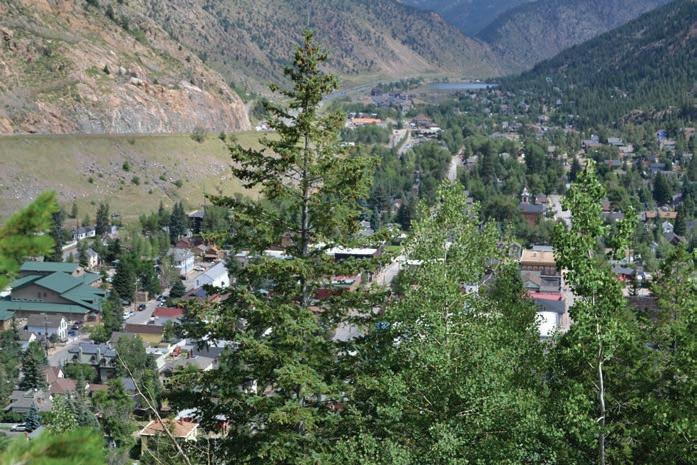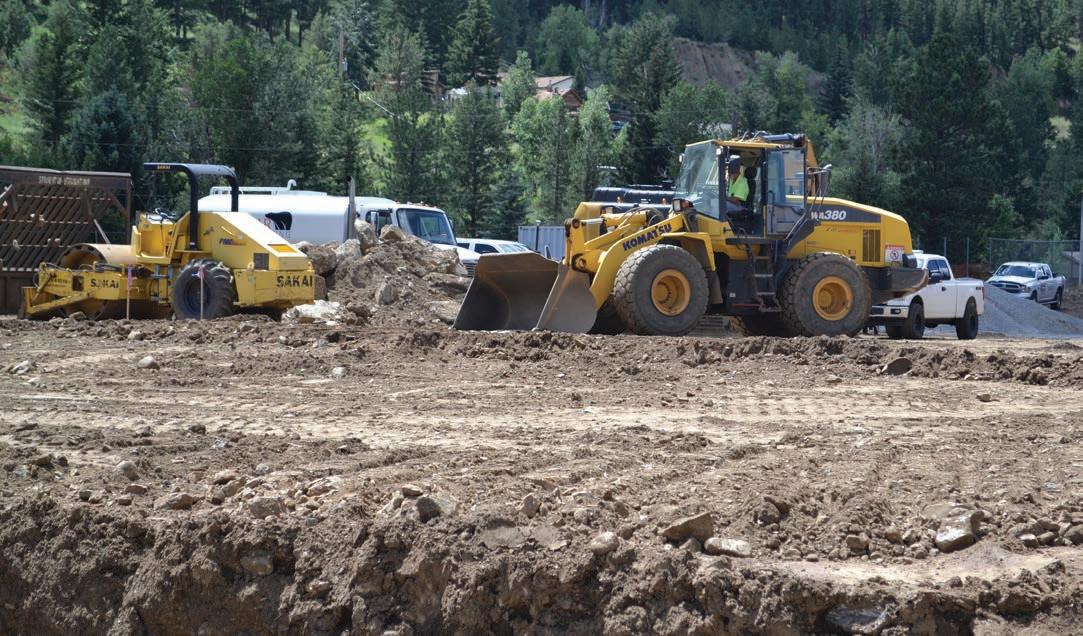
5 minute read
Georgetown residents see price increase for water and sewer services
BY CHRIS KOEBERL CKOEBERL@COLORADOCOMMUNITYMEDIA.COM








A $4 at rate increase for water and sewer in Georgetown is largely due to in ation, according to the Clear Creek County treasurer’s o ce. e monthly charge for water usage — known as the Equivalent Residential Unit or the average number of gallons of water a typical household uses — has increased $2.98 per month, and sewer charges increased $1.02 per month. e rate increase is based on a 20year projection created in 2010.
A single-family home using up to 7,000 gallons of water a month will pay approximately $141 per month for the combined services, a town o cial said. Households using more than 7,000 gallons per month will see an incremental increase in charges.
Weather Observations for Georgetown, Colorado
Week of July 31, and Month of July 2023
A local National Weather Service volunteer observer makes temperature and precipitation observations each day at about 8 a.m. at the Georgetown Weather Station. Wind observations are made at Georgetown Lake. “Max” and “Min” temperatures are from digital displays of a “MMTS” (“Maximum/Minimum Temperature System”); “Mean daily” temperature is the calculated average of the max and min. “Total Precipitation” is inches of rainfall plus melted snow. “Snowfall” is inches of snow that accumulated during the preceding 24 hours. T = Trace of precipitation. NR = Not Reported. “Peak wind gust at Georgetown Lake” is the velocity in miles per hour and the time of the maximum wind gust that occurred during the 24 hours preceding the observation time. Historic data are based on the period of record for which statistical data have been compiled (about 54 years within the period 1893-2022). Any weather records noted are based on a comparison of the observed value with the historical data set.
Weather Observations for Georgetown, Colorado observation time. Historic data are based on the period of record for which statistical data have been compiled (about 54 years within the period 1893-2022). Any weather records noted are based on a comparison of the observed value with the historical data set. ceedings Idaho over the nance believes comply the ing the have ing. to to written in district 9 City The city gotten before south former its control, ing, erosion because neighborhoods. plans sewer district quired to associated because under rather Safety’s and for ing judge continuing the torney, the doesn’t an tion not I issues. that risdiction tion), that Year-long have TMF ters documents. ceedings to settle a dispute between Idaho Springs and the school district over permits for the bus barn, called the Transportation and Maintenance Facility or TMF. e city believes the school district needs to comply with city regulations while the school district believes the building falls under state regulations, so the city — and therefore the judge — have no jurisdiction over the building.


Both sides now have a timeline to submit written documentation to Goodbee, who said he wanted written arguments from both sides, in case the side that loses appeals to district court.
He also scheduled a trial starting at 9 a.m. Sept. 22 in the Idaho Springs City Hall.
The issues e school district believes that because it’s a public entity, it falls under the jurisdiction of the state rather than the City of Idaho Springs. e Colorado Department of Public Safety’s Division of Fire Prevention and Control issues building permits for school districts, it says.
According to court documents, the city says the school district hasn’t gotten the proper zoning approvals before site work began at the track south of Building 103, which is the former middle school. e city says its regulations concerning tra c control, lighting, landscaping, parking, noise, drainage, stormwater and erosion control apply to the project because they impact surrounding neighborhoods.
Furthermore, the school district plans to tap into the city water and sewer lines. e city says the school district has not obtained the required taps, licenses and permits to do this work nor has it paid the associated fees.

Nick Klein, the attorney representing Idaho Springs, requested that the judge stop the school district from continuing to develop the site until the legal issues are resolved.
Brent Case, the school district’s attorney, opposed the request because the school district believes the court doesn’t have the authority to impose an injunction or a restraining order.
“I’m not granting (the city’s) motion to (stop construction), and I’m not denying it,” Goodbee said. “First I need to resolve the jurisdictional issues. … It is certainly a possibility that if the court is found to have jurisdiction (and if it issues an injunction), there are days of violations that could accumulate.”
Year-long history e city and the school district have gone back and forth over the TMF permits for a year, with the letters and emails attached to the court documents.
In August 2022, Idaho Springs City e district responded that since it was going through the Colorado Division of Fire Prevention permitting process, the school district would provide a courtesy copy of the plans to the city.


Administrator Andy Marsh sent a letter to the school district explaining the city’s authority to review the TMF except for the location and construction methods because those are outside the city’s purview. e school district then sent a land-use application to begin the Final Development Plan, and the city expected it would take less than two months to complete the review.
Idaho Springs requires a Final Development Plan for commercial, industrial and higher-density residential projects within the city, according to court documents. It is similar to what other municipalities call a site plan or a development plan.

A response from the city said, “To clarify, the city is not asking to review ‘construction documents.’ Rather, the city is pointing you to the required Final Development Plan public process for this development.”

After several months of silence between the two entities, correspondence resumed in May, and the school district reiterated its stance that it did not need to go through the city’s Final Development Plan process.
Instead, wrote attorney Case, city o cials “may request a public hearing before the Board of Education relating to the proposed site location or site development plan.”
Case also wrote: “Courts have long held that public entities have the power to overrule or disregard the restrictions of county or municipal zoning regulations.”
In July, City Attorney Carmen Beery wrote again to the school district that Buildings By Design, the company constructing the TMF, came “to City Hall to apply for an excavation permit, contractor’s license and to notify the city that the school district plans to tap into the city water and sewer lines and to excavate Highway 103 to do so. e district has not obtained the required taps, licenses and permits to do this work nor has it paid the associated fees.”
Subsequently, on July 13, the city issued a cease and desist order to stop demolition and earth-disturbance activity on the track because neither “(Buildings By Design) nor any of its known subcontractors are licensed to work within the City of Idaho Springs. Additionally, the district has not completed the relevant land-use processes, obtained the required taps, licenses or permits for this work, nor has it paid the associated fees.”








